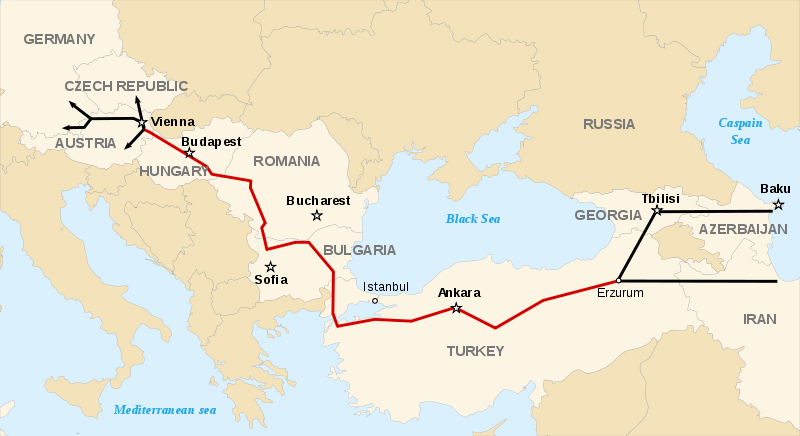The U.S. is making concerted effort to revive plans for a 3,300 km long natural gas pipeline that stretches from the Caspian sea through Turkey to Austria. This Nabucco pipeline is still very much in its infancy, lacking adequate supply of natural gas as well as lacking transit rites through intermediary countries in order to become viable enough to start building. This pipeline could potentially provide energy from Central Asia, and the Caucasus to Europe, diversifying Europe’s supplies of natural gas.
Russia has so far successfully maintained its dominance over Europe’s energy markets. It has done this by outplaying the US under president Bush with the important energy producers of Central Asia, by sewing insecurity into existing Western energy routes through the region by strafing yet leaving undamaged the Baku-Tbilishi-Ceyhan pipeline during the short Russia-Georgia war, and by promising an alternative to Nabucco: South Stream.
South Stream is a proposed 900 km pipeline that would cross the Black Sea into Bulgaria and branch into Austria and Italy. It is still uncertain whether South Stream, Nabucco, or both might realize expectations of providing increased natural gas supply through to south eastern Europe.
U.S. president Barack Obama last week appointed Richard Morningstar to head up Eurasian energy policy. MK Bhadrakumar writes in Asia Times that Morningstar, under president Clinton, successfully championed the Baku-Tbilisi-Ceyhan oil pipeline.
In 1998, Morningstar was quoted as saying that, “the fundamental objective of the U.S. policy in the Caspian is not simply to build oil and gas pipelines. Rather it is to use those pipelines, which must be commercially viable, as tools for establishing a political and economic framework that will strengthen regional cooperation and stability and encourage reform for the next several decades.”
Bhadrakumar states that Morningstar has been very busy and pragmatic in his first week in office under president Obama. He has been trying to win a supply deal from gas rich Turkmenistan in order to transit that energy across the Caspian sea and through to Europe. He has also stated that the U.S. would consider striking a deal with Iran for natural gas. It has even been suggested that some Western technology may be made available to Iran’s energy sector if a natural gas deal was concluded.
Talk of purchasing natural gas from Iran can well be a carrot in negotiations between the U.S. and Iran on the latter country’s nuclear program. Also, the U.S. has been seeking some degree of increased cooperation from Iran in order to stabalize Afghanistan. It was today announced that Iran, Pakistan, and Afghanistan officials plan to meet monthly in order to cooperate on security and stability in the region.
Having Iran join the proposed Nabucco pipeline would have that energy rich country enter into what would become an increasingly competitive market for European consumers, eroding Russia’s dominance.
The likelihood of Iran joining the Nabucco project is slim in the short-term. Tensions are still high between the U.S. and Iran, and this proposal is likely to serve both as an incentive to Iran and as a display of how serious the U.S. is about making the proposed pipeline a reality, thus bolstering the confidence of currently lackluster potential investors.



